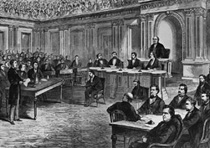At a Glance
Description
How much do you know about the history of the American Senate? Click here for background information on this component of our legislative branch.
Website
Producer
U.S. Senate Historical Office

This collection of essays about the history of the U.S. Senate begins with a brief overview (900 words). More than 140 "historical minutes" (300 words) discuss interesting events in the Senate from 1789 to 1980. Events include the caning of Charles Sumner in 1856, the 1914 ban on smoking in the Senate chamber, and a 1935 Huey Long filibuster. The complete texts of 15 oral histories, of 40 to 700 pages, of retired senators and Senate staff members are available and 15 others may be ordered. The oral histories cover 1910 to 1984 and deal with a wide range of issues, including the desegregation of the staff, the McCarthy hearings, preparations to impeach Nixon, rhetorical rules of debate, and the impact of computers on the work of the senate. Staff members include pages, the Sergeant at Arms, aides, administrative assistants, and the first African-American Government Documents Clerk. A collection of 26 essays (500 to 3000 words) discuss Senate procedure, leadership, officers of the Senate, and general information, such as the development of the oath of office. Other essays include 2,400 words on the president pro-tempore and a 1,300 word essay on the 1959 committee, chaired by John F. Kennedy, that designated the five most outstanding senators in American history.
The site also includes a section of frequently asked questions about the Senate and links to a directory that provides a 150-word biography of every senator and vice president as well as many congress people and staff members. Statistics about majority and minority leaders and the practice of switching parties are also provided. The minutes of Senate Republican Conferences from 1911 to 1964 and Senate Democratic Conferences from 1903 to 1964 are available in their entirety. Visitors may also read the full texts of eight lectures given by statesmen, such as George Bush and Senator Robert C. Byrd as part of the Leaders Lectures series established in 1988 by Trent Lott. The site is easy to navigate and will be useful for research in the history of American political institutions.